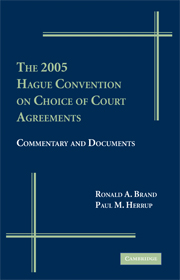Book contents
- Frontmatter
- Contents
- Preface
- PART I A BASIC INTRODUCTION TO THE 2005 HAGUE CHOICE OF COURT CONVENTION
- PART II ARTICLE-BY-ARTICLE COMMENTARY ON THE CONVENTION
- 4 Scope and Definitions (Articles 1–4)
- 5 Jurisdiction (Articles 5–7)
- 6 Recognition and Enforcement (Articles 8–15)
- 7 General Clauses (Articles 16–26)
- 8 Final Clauses (Articles 27–34)
- PART III CHOICE OF COURT IN THE ABSENCE OF A MULTILATERAL CONVENTION
- PART IV LITIGATION AND ARBITRATION CHOICES AFTER THE HAGUE CONVENTION
- Appendix A Explanatory Report by Trevor Hartley & Masato Dogauchi (including the text of the 2005 Hague Convention on Choice of Court Agreements)
- Appendix B Cited Excerpts from the Nygh-Pocar Report
- Index
8 - Final Clauses (Articles 27–34)
from PART II - ARTICLE-BY-ARTICLE COMMENTARY ON THE CONVENTION
Published online by Cambridge University Press: 26 October 2009
- Frontmatter
- Contents
- Preface
- PART I A BASIC INTRODUCTION TO THE 2005 HAGUE CHOICE OF COURT CONVENTION
- PART II ARTICLE-BY-ARTICLE COMMENTARY ON THE CONVENTION
- 4 Scope and Definitions (Articles 1–4)
- 5 Jurisdiction (Articles 5–7)
- 6 Recognition and Enforcement (Articles 8–15)
- 7 General Clauses (Articles 16–26)
- 8 Final Clauses (Articles 27–34)
- PART III CHOICE OF COURT IN THE ABSENCE OF A MULTILATERAL CONVENTION
- PART IV LITIGATION AND ARBITRATION CHOICES AFTER THE HAGUE CONVENTION
- Appendix A Explanatory Report by Trevor Hartley & Masato Dogauchi (including the text of the 2005 Hague Convention on Choice of Court Agreements)
- Appendix B Cited Excerpts from the Nygh-Pocar Report
- Index
Summary
INTRODUCTION
Chapter V of the Convention contains its final clauses. Many of these clauses contain provisions that are standard in private international law treaties generally, or in other Hague Conventions. They should be interpreted accordingly. However, some of the clauses in this Convention vary from standard clauses, and are tailored to policy objectives in this Convention.
ARTICLE 27: SIGNATURE, RATIFICATION, ACCEPTANCE, APPROVAL OR ACCESSION
Article 27 Signature, ratification, acceptance, approval or accession
This Convention is open for signature by all States.
This Convention is subject to ratification, acceptance or approval by the signatory States.
This Convention is open for accession by all States.
Instruments of ratification, acceptance, approval and accession shall be deposited with the Ministry of Foreign Affairs of the Kingdom of the Netherlands, Depositary of the Convention.
Article 27 sets forth the mechanisms by which a state may become a Contracting State to the Convention. Articles 29 and 30, discussed below, provide the similar rules applicable to Regional Economic Integration Organizations, which are not covered by Article 27.
Article 27 demonstrates a policy decision to open the Convention to wide participation. The Convention is open for signature by all states – whether or not they are Member States of the Hague Conference on Private International Law. Once a state has signed the Convention, it may become a Party by ratification, acceptance or approval.
- Type
- Chapter
- Information
- The 2005 Hague Convention on Choice of Court AgreementsCommentary and Documents, pp. 174 - 182Publisher: Cambridge University PressPrint publication year: 2008



